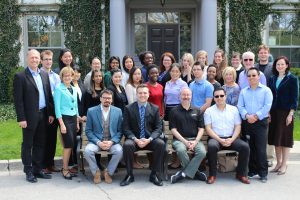On May 5 I spoke on the issue of Human Rights and Christian Ministries at the Christian Legal Institute in London, Ontario. Below are the notes I used for my talk.
Introduction: Why Human Rights Protections Are Necessary
The conscience of the world was seared at the end of World War II. The unfathomable inhumanity towards the “other” was in full display in Auschwitz and other European torture factories. Never was the world more aware of the need to eliminate not only the rhetoric of discrimination but the acts of discrimination. When the atrocities of WWII removed the scales from the world’s eyes every country was forced to face its own inhumanity. Canada was no different. We blushed at our own failings. The internment of Japanese Canadians, conscientious objectors, and others. Private prejudice was evident. Land was sold, in Canada, on the condition that it not be ever sold to racial and religious minorities. Individuals lost their jobs because of the religious day of worship they kept. Rentals were denied to minorities. Many businesses refused to sell or cater to minorities based on irrational prejudice. The list goes on.

Barry speaking at Christian Legal Institute
While the 1947 Saskatchewan Bill of Rights Act outlined a number of human rights it lacked any enforcement provision. It was the 1962 Ontario Human Rights Code[i] that got Canada’s “human rights train” to leave the station. For the first time human rights legislation had the means to enforce human rights standards. Suddenly, it was unlawful to discriminate against anyone on the basis of race, creed, colour, nationality, ancestry or place of origin in areas such as employment, housing, goods & services, contracts, and membership in vocational associations.
Though some fifty plus years have passed since Ontario enforced human rights we continue to see human rights abuses in Canada. For example, in its 2014 Annual Report the Canadian Human Rights Commission states that while women are excelling in education they continue to earn less than men.[ii] We must remain ever vigilant. It is fair to say that Canadians have developed, over time, a hypersensitivity to human rights. We have established our own Canadian Human Rights Museum,[iii] and human rights agencies exist in all provinces and territories.
The Role of Christian Charities in Protecting Human Rights
“The historic relationship between Christianity and human rights,” as noted by Professor Charles Villa-Vicencio, “is an ambiguous one. For hundreds of years the Christian Church actively promoted religious intolerance and persecuted those who failed to accept its moral values and customs.”[iv] Indeed, Canada is only now coming to grips with what happened to Aboriginal Canadians in the Christian residential schools.[v] Yet, such violations were and remain an anomaly and violation of the very clear admonitions of the Sermon on the Mount. While “human rights ideals are rooted nowhere else than in the biblical tradition,” they “remained a minority tradition (within the Church) for centuries.”[vi] Notwithstanding, the missteps, Christians continue to do much to alleviate the sufferings of humanity.

Barry speaking at Christian Legal Institute
On any given day in Canada Christian charities continue to provide works of charity that alleviate human rights abuses: thousands of meals are served in city soup kitchens; thousands of articles of clothing are given or sold at nominal prices to the poor and the working poor; thousands of students attend Christian elementary and secondary schools, along with thousands of students attending Christian universities; thousands of students receive after school tutoring; hundreds if not thousands attend Alcoholic Anonymous meetings in churches; new immigrants are assisted with getting settled in their new communities and attend English as a 2nd Language Courses; thousands of people are resident in Christian nursing homes; thousands of religious meetings are held throughout Canada including funerals, and marriage ceremonies; Christian chaplains make thousands of visits to comfort the sick and the grieving families who suffered the loss of loved ones; hundreds of blind people receive special assistance with books and listening materials; many millions of dollars are sent overseas by Christian agencies for development and relief work at villages in the Developing World for projects such as schools, fresh water wells, hospitals, universities, emergency aid such as food, medicine and shelter; young girls are freed from brothels around the world; widows whose property was unjustly confiscated after the death of their husbands have their rights restored.
Thus, it can be said that Christian charities applying the principles of The Sermon on the Mount have done, and continue to do, much to alleviate human rights abuses.
Christian Community and Human Rights Bureaucracy – A rising tension Over Sexuality
There is an uneasiness in the Christian community about the expansion of human rights. This tension has arisen over the very different understandings of legal and moral norms with respect to human sexuality. The right of a person not to be discriminated against because of their sexual orientation is, perhaps, the most sensitive flashpoint between human rights bureaucracy and Christian charities for the last several decades and reached a high point in the case of Bill Whatcott.[vii]
Whatcott and Religious Speech
Bill Whatcott distributed four flyers in Regina and Saskatoon on behalf of his ministry Christian Truth Activists. Two of the flyers were entitled “Keep Homosexuality out of Saskatoon’s Public Schools!” and “Sodomites in our Public Schools.” The other two flyers were a reprint of a page of classified advertisements to which handwritten comments were added. Four people who received the flyers filed a complaint with the Saskatchewan Human Rights Commission. Eventually the Supreme Court of Canada decided the matter.
The Supreme Court outlined a three step analysis to determine whether a person has violated the “hatred” provision in human rights legislation. First, courts must objectively ask whether a reasonable person, aware of the context and circumstances, would view the expression as exposing the protected group to hatred. Second, “hatred” or “hatred or contempt” must be interpreted as being restricted to those extreme manifestations of the emotion. While the language may be repugnant and offensive, it does not come to the level of abhorrence, delegitimization and rejection that would cause discrimination. Third, is it likely to expose the targeted person or group to hatred by others?
Whatcott’s flyers, according to the Court, combined expression exposing homosexuals to hatred with expression promoting discriminatory treatment of homosexuals. The examples of the hate-inspiring representations were: “Now the homosexuals want to share their filth and propaganda with Saskatchewan’s children”; “degenerated into a filthy session where gay and lesbian teachers used dirty language to describe lesbian sex and sodomy to their teenage audience”; “proselytize vulnerable young people”; “ex-Sodomites and other types of sex addicts”; and “[h]omosexual sex is about risky & addictive behaviour!”
The repeated references to “filth”, “dirty”, “degenerated” and “sex addicts” or “addictive behaviour,” said the Court, emphasizes the notion that those of same-sex orientation are unclean and possessed with uncontrollable sexual appetites or behaviour. This would lead a reasonable person to conclude from the flyers that homosexuals, by virtue of their sexual orientation, are inferior, untrustworthy and seek to proselytize and convert our children.[viii] “[B]y equating homosexuals with carriers of disease, sex addicts, pedophiles and predators who would proselytize vulnerable children and cause their premature death, Flyers D and E would objectively be seen as exposing homosexuals to detestation and vilification.”[ix] Arguing that there should be a law against homosexuality as a result of these problems was advocating discriminatory treatment.
The Court held that framing the speech in a moral context will not “cleanse” it. In other words, you cannot use your religious belief and context to legitimize hate speech. Further, intention is irrelevant. Nor can you claim sincerity and/or truth as a defense:
However, I do not think it is inconsistent with these views to find that not all truthful statements must be free from restriction. Truthful statements can be interlaced with harmful ones or otherwise presented in a manner that would meet the definition of hate speech. … To the extent that truthful statements are used in a manner or context that exposes a vulnerable group to hatred, their use risks the same potential harmful effects on the vulnerable groups that false statements can provoke. The vulnerable group is no less worthy of protection because the publisher has succeeded in turning true statements into a hateful message.[x]
Nor can you use the concept that you love the sinner but hate the sin as the behaviour is crucial to the identity of the group. Nor can you use religious texts to give “credible authority” to hateful opinions – in fact use of such texts may indicate hate speech in “unusual circumstances and context.” This is problematic as it remains unclear how the courts will determine whether those passages would be hateful in various contexts – what if used in a sermon against homosexuality for example?
The Court in Whatcott focused not only on the actual negative effects but on the likelihood of negative effects of the discrimination. This approach is at the expense of a long-held principle in law that a person is not to be held as responsible for something she did not intend. “Strict liability” – that is to say you are responsible for the effects of your actions whether you intended the effect or not – is rare. However, in the human rights context it is having a “chilling effect” on Christian ministries across Canada. Though a conviction under human rights legislation is not at all in the same category as being found guilty of a crime; nor is the requirement to pay damages to compensate the person or persons who were discriminated the same as having to pay damages as punishment; the fact remains that being found in violation of a human rights statute carries a significant social punishment of derision and though damages are meant to be “compensatory” they will, in all likelihood, be considered as “punitive” by those who committed unintentional discrimination.
Knights of Columbus and Rental Agreements
Consider the 2005 case of The Knights of Columbus (K of C), in Port Coquitlam, BC.[xi] Deborah Chymyshyn approached the K of C for the use of their facilities for her wedding. However, the K of C were not aware, at the signing of the rental contract, that Ms. Chymyshyn was marrying another woman, Tracey Smith. Being a Roman Catholic lay organization the K of C supports the traditional definition of marriage and once they realized their facility was rented for a same-sex wedding reception they broke the contract. The couple went to the BC Human Rights Tribunal. The tribunal held that the K of C had a right to refuse to rent based on their religious convictions but fined it for “injury to dignity, feelings and self-respect” of the women.
Christian Horizons and Employment
The Heintz v. Christian Horizons[xii] case has captured the attention of Canada’s Christian charities like no other. Christian Horizons ministers to those with developmental disabilities. It had a Lifestyle and Morality Statement in its employment contracts which stated that certain conduct, including “homosexual relationships”, was incompatible with the charity’s standards. Ms. Heintz, a Christian, was employed as a support worker in a community living residence operated by Christian Horizons. She alleged that she was discriminated against based on her sexual orientation. When she revealed her same sex relationship to her coworkers the work environment became untenable. Christian Horizons argued that it was exempt from the Human Rights Code because it is a religious organization and could give hiring preference to those who identified with its religious beliefs. It also argued that the requirement was a bona fide qualification because of the nature of the employment.
The Ontario Human Rights Tribunal said no on both accounts. First, Christian Horizons was not primarily engaged in serving the interests of Evangelical Christians but serving people with developmental disabilities in the broader public sector and therefore was not exempt from the Code. Second, the Tribunal did not agree that the requirement was a bona fide occupational requirement.
The Divisional Court disagreed with the Tribunal’s approach of determining exemption from the Code based on the private/public nature of Christian Horizons’ work. The Court held that Christian Horizons provided its services as part of its religious beliefs and was therefore, “primarily engaged in serving the interests of persons identified by their creed.”[xiii] However, the Court, did agree with the Tribunal on the bona fide occupational requirement. It held that “[t]here is nothing about the performance of the tasks (cooking, cleaning, doing laundry, helping residents to eat, wash and use the bathroom, and taking them on outings and to appointments) that requires an adherence by the support workers to a lifestyle that precludes same sex relationships.”[xiv] Therefore, Christian Horizons could not discriminate on the basis of sexual orientation. However, the Court allowed the rest of Lifestyle and Morality Statement to remain.
Conclusion: Fundamental Differences
What we can observe is the following. We know from the historic abuses that the protection of human rights is fundamental to the health of our society. As Christians engaged in humanitarian work, Christian charities have a very important role to play in alleviating the sufferings of our fellow man. We are on the front lines making a positive difference.
The current struggle between human rights agencies and Christian charities has to do primarily with the issue of human sexuality. Indeed, one of the hardest concepts for many Christian charities to comprehend is that current thinking on human rights has very little patience for the idea of “loving the sinner but hating the sin.” That saying has a long historical significance to Christians as being short hand for recognizing the fact that, as humans we are made in the image of God of inestimable value despite whatever we might do.[xv] It is a distinction that separates acts from the person. Yet, what appears inoffensive to the non-LGBT Christian community is very offensive to the LGBT community.
The LGBT community sees their sexuality as a fundamental, innate, part of their human existence. When they are told that their sexuality is sinful it is as if they are under personal attack. They reason that there is no other innate characteristic that is permitted to be disapproved in such a manner. For them, their sexuality is not a choice – it is who they are. Why, then, they would argue, must they renounce such a “God-given” characteristic? This is the deep-seated controversy of our age. It is a giant chasm. It is one we have to live with.
It is necessary to develop the awareness and skill in navigating the reality of human rights protection. Our future, as Christian ministries, demands no less than the ability to not only honour and respect the human rights of others but also honour our mission to share the Good News of the Gospel. It requires tact, respect, empathy, patience and love for our fellowman.

Christian Legal Institute 2016
[i] See, “The Birth of Human Rights Codes,” online at: http://www.chrc-ccdp.ca/en/timePortals/milestones/89mile.asp
[ii] http://www.chrc-ccdp.gc.ca/eng/report/2014/issues/not-an-equal-playing-field
[iii] https://www.civilandhumanrights.org/
[iv] Charles Villa-Vicencio, “Christianity and Human Rights,” Journal of Law and Religion, Vol. 14, No. 2 (1999 – 2000), pp. 579-600, at page 579.
[v] http://www.trc.ca/websites/trcinstitution/index.php?p=3
[vi] Charles Villa-Vicencio, “Christianity and Human Rights,” at page 579 quoting Max Stackhouse, “Religion and Human Rights: A Theologic Apologetic,” in John Witte, Jr. and Johan van der Vyver, eds, Religious Human Rights in Global Perspective: Religious Perspectives (Martinus Nijhoff, 1996), p. 492.
[vii] Saskatchewan (Human Rights Commission) v. Whatcott, 2013 SCC 11, [2013] 1 S.C.R. 467
[viii] At paragraph 188.
[ix] At paragraph 190.
[x] At paragraphs 140-141.
[xi] http://www.bchrt.bc.ca/decisions/2005/pdf/Smith_and_Chymyshyn_v_Knights_of_Columbus_and_others_2005_BCHRT_544.pdf
[xii] Heintz v. Christian Horizons, [2008] O.H.R.T.D. No. 21; Ontario Human Rights Commission et al. v. Christian Horizons 102 O.R. (3d) 267, 2010 ONSC 2105
[xiii] Ontario Human Rights Commission et al. v. Christian Horizons, at para. 77.
[xiv] Ontario Human Rights Commission et al. v. Christian Horizons, at para. 104.
[xv] Some suggest, “It’s from St. Augustine. His Letter 211 (c. 424) contains the phrase Cum dilectione hominum et odio vitiorum, which translates roughly to “With love for mankind and hatred of sins.” The phrase has become more famous as “love the sinner but hate the sin” or “hate the sin and not the sinner” (the latter form appearing in Mohandas Gandhi’s 1929 autobiography).” See: http://www.catholic.com/quickquestions/who-said-love-the-sinner-hate-the-sin

